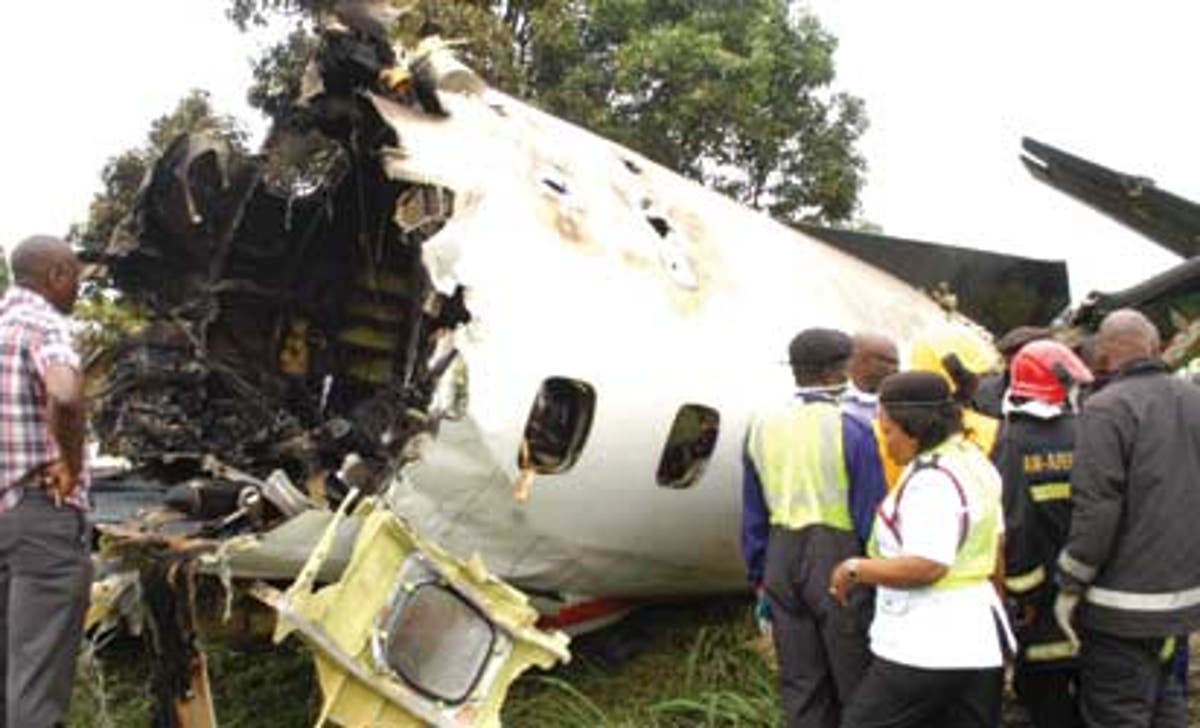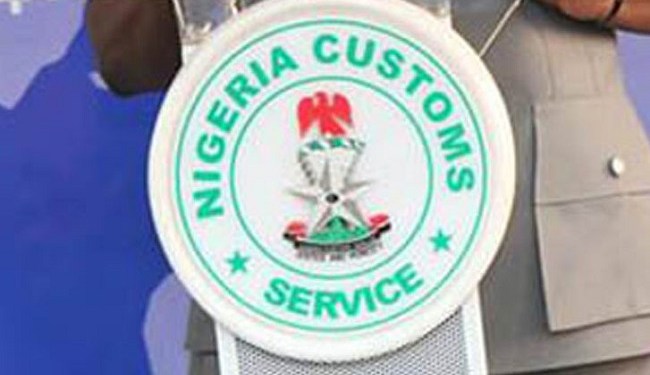AIB releases final reports on Kabo Air crash, two others

…issues 16 safety recommendations

The Accident Investigation Bureau, Nigeria (AIB-N) has released final reports on three aircraft belonging to Kabo Air, Aero Contractors and Skybird that suffered serious incidents in different timelines.
The Bureau also announced the release of two Safety Bulletins on two Tampico Club TB-9 Aircraft owned and operated by the Nigerian College of Aviation Technology (NCAT), which had minor incidents in 2013 and 2014 respectively.
On the final reports, the Commissioner and Chief Executive Officer of the Bureau, Engr. Akin Olateru, said the Bureau has succeeded in releasing a total of 59 final reports since its establishment in 2007, while a total of 40 final reports out of these were under his watch.
Along with the reports, Olateru said “We are releasing 16 Safety Recommendations, which are very important towards preventing recurrence of such serious incidents when the safety recommendations are adhered to.”
With these 16 safety recommendations, Olateru disclosed that the Bureau had released a total of 211 Safety Recommendations since the inception of AIB and a total of 127 Safety Recommendations released under his watch.
Olateru underscored the importance of on-time release of investigation reports and safety recommendations as they are tied to enlightening industry stakeholders on the need to adhere strictly to safety precautions with a view to prevent such incidents in future.
He lauded the efforts of his team and other agencies that supported the Bureau in living up to its core mandate – accident investigation – and enjoined stakeholders to digest the safety recommendations carefully so as to save the industry from preventable incidences.
“Since the inception of this administration in 2017, we have been committed to prompt release of accident reports and safety recommendations to the public.
This is a feat that would not have been achieved if not for the immense support the Bureau has been able to garner from various organisations and agencies, most importantly from the Ministry of Aviation. I would like to seize this opportunity to appreciate our Honourable Minister for Aviation, Sen. Hadi Sirika for his continuous support of our activities at AIB-N.
I cannot appreciate my team of air safety investigators enough for their relentless effort in ensuring that aircraft accidents and serious incidents are effectively, efficiently and professionally investigated with final reports on these occurrences promptly released,” said Olateru.
He also harped on the importance of regular staff training as a basic requirement to build capacity and improve on evolving technicalities on safety management in the aviation industry.
“Every organisation needs to recognise that continuous human training and capacity building is very important in order to get the best out of their staff. This, coupled with equipping them with the right tools that they would require during the discharge of their duties will allow them to effectively and efficiently perform excellently.
This we have been able to recognise and achieve at AIB and I would like to call on other agencies and organisations in the aviation industry and outside the aviation industry to recognise human training and capacity building as one of the most important means of boosting their staff performance thereby boosting their prestige and resources,” he said.
The reports and safety bulletins are captured below:
REPORT ON THE SERIOUS INCIDENT INVOLVING A GULFSTREAM G-IV AIRCRAFT OWNED AND OPERATED BY SKYBIRD AIR LTD WITH NATIONALITY AND REGISTRATION MARKS 5N-BOD WHICH OCCURRED AT NNAMDI AZIKIWE INTERNATIONAL AIRPORT, ABUJA ON 12TH SEPTEMBER, 2018;
Accident Investigation Bureau; Nigeria (AIB-N) was notified of the serious incident by FAAN through a phone call. Safety Investigators were dispatched immediately to the site and commenced preliminary investigation.
On 12th September, 2018 at about 20:20 h, a Gulfstream IV (G-IV) aircraft with nationality and registration marks 5N-BOD operated by SkyBird Air Ltd, on an Instrument Flight Rules (IFR) Flight Plan, departed Murtala Mohammed International Airport (DNMM) Lagos for Nnamdi Azikiwe International Airport (DNAA), Abuja on a post-charter return to base flight, with One (1) person and Five (5) crew on board, with an endurance of four hours. The Captain was the Pilot Flying (PF) while the First Officer was the Pilot Monitoring (PM).
The aircraft departed Lagos at 20:20 h and climbed to Flight Level 350 (FL350) as cleared. The en-route weather was stormy almost all the way. Following an uneventful flight, the aircraft was in contact with the DNAA Approach Radar and was given a clearance for Radar Vectors for an ILS approach Runway (RWY) 22.
At 21:11 h, 5N-BOD established initial contact with Abuja Control Tower and reported 9 NM finals and fully established on ILS RWY 22. The controller advised the crew to exercise caution as runway surface was wet, and thereafter cleared the aircraft to land. 5N-BOD acknowledged and continued approach normally.
Upon touchdown, the captain noticed the aircraft was not decelerating as it should and that the Thrust Reversers (TR) were not deploying, even though he could see physically that the aircraft was properly configured. He pulled the speed brake handle to possibly force the Nutcracker, (Weight on Wheel Switches), into the “Ground Mode” and get the TR to deploy.
The aircraft exited the end of the runway, travelled over a grassy area before it came to a stop in mud at approximately 71m from the end of RWY 22.
After the aircraft finally came to a complete stop, the flight crew shut down the engines, the lead cabin attendant opened the forward main entry door and all occupants exited the aircraft unhurt.
The Aerodrome Rescue and Fire Fighting Services (ARFFS) arrived the scene and provided fire cover and lighting support for the area.
The accident occurred at 21:14 h at night.
CAUSAL FACTOR
Delayed response by the crew to recognize that the ground spoilers and thrust reversers were locked out led to the runway overrun.
The delayed deployment of ground spoilers led to the flight crew’s problems in stopping the airplane within the remaining available runway length.
Nine safety recommendations were made
1 Safety Recommendation 2020-004
FAAN should ensure that disabled aircraft are promptly removed from the incident site in accordance with Disable Aircraft Recovery Manual NAIA Abuja (Chapter 3 REMOVAL INSTRUCTIONS NAIA).
2 Safety Recommendation 2020-005
FAAN should ensure the Roles and responsibilities of stakeholders as stipulated in the Airport Emergency Plan (AEP) are strictly adhered to in case of any occurrence.
3 Safety Recommendation 2020-006
FAAN should ensure that ARFFS units are adequately staffed at a level that enables ARFFS personnel, upon arrival at an accident scene, to conduct exterior fire-fighting activities, interior fire suppression attack and a rescue mission concurrently.
4 Safety Recommendation 2020-007
NCAA should ensure that all G-IV operators adhere strictly to normal operating procedures regarding the nutcracker system.
5 Safety Recommendation 2020-008
NCAA should ensure that all G-IV operators, require flight crew to call-out if the ground spoilers do not automatically deploy and the thrust reversers are not deployed during landing, also a call-out when the ground spoilers have deployed, and verify they include these procedures in their checklists, and training programs. The procedures should clearly identify which pilot is responsible for making these call-outs and which pilot is responsible for deploying the spoilers if they do not automatically deploy.
6 Safety Recommendation 2020-009
NCAA should intensify its oversight function on Skybird Air Limited’s operations.
7 Safety Recommendation 2020-010
NCAA should comply with the AOC application/renewal process and ensure that the process is completed in accordance with the guidance materials issued by the Authority prior to issuance of the AOC to applicants.
8 Safety Recommendation 2020-011
SkyBird Air Limited should ensure that all their cabin crew are adequately and properly type rated on specific aircraft to be flown by a cabin crew member in accordance with the Operations Manual.
9 Safety Recommendation 2020-012
SkyBird Air Limited should ensure that all flight release documents are duly signed by the commander of the flight before departure and appropriate copies kept on board the flight.
| 2 |
REPORT ON THE SERIOUS INCIDENT INVOLVING A BOEING 747-200 AIRCRAFT OWNED AND OPERATED BY KABO AIR LTD WITH NATIONALITY AND REGISTRATION MARKS 5N-JRM WHICH OCCURRED AT SULTAN ABUBAKAR AIRPORT, SOKOTO (DNSO), SOKOTO STATE ON 4TH OCTOBER, 2013;
Accident Investigation Bureau; Nigeria (AIB-N) was notified of the occurrence on 5th October, 2013 by Kabo Air Limited, the operator. The preliminary investigation commenced on 7th October, 2013.
On 4th October, 2013 at about 20:59 h, a Boeing 747-200 aircraft with nationality and registration marks 5N-JRM, operated by Kabo Air Limited as a charter (Hajj) flight with call sign QNK617, departed Mallam Aminu Kano International Airport (DNKN) Nigeria, en route King Abdul-Aziz International Airport Jeddah (OEJN), Saudi Arabia via Sultan Abubakar Airport, Sokoto (DNSO), Nigeria, on an Instrument Flight Rules (IFR) Flight Plan.
There were 512 persons on board, inclusive of 18 crew members with seven hours’ fuel endurance. The Captain was the Pilot Flying (PF) and the Co-pilot was the Pilot Monitoring (PM).
On contact with DNSO Air Traffic Control (ATC), flight QNK617 was cleared for ILS approach Runway 08. The crew reported field in sight and elected for visual straight-in approach Runway 26. During the approach to land, QNK617 impacted the Localizer Antenna/Approach Lighting System, touched down 100m short of RWY 26 threshold at 21:40 h and continued with the landing roll onto the runway until it came to a stop. The aircraft then taxied to the apron.
During transit walk-around, the crew found that two of the aircraft’s right main wheel tyres had burst. There was no reported injury to persons on board.
The incident occurred at 21:40 h, at night.
The investigation identified the following causal and contributory factors:
CAUSAL FACTOR
Inappropriate visual approach profile at night with no vertical guidance.
CONTRIBUTORY FACTORS
- Unserviceable Visual Approach Slope Indicator (VASI) on Runway 26.
- Decision to land on the non-precision runway 26 at night.
One safety recommendation was made
Safety Recommendation 2020-013
Kabo Air should ensure that flight recording devices (FDR and CVR) installed on all aircraft in its fleet are preserved, maintained, serviceable, and operated in accordance with the provisions of the existing Nigeria Civil Aviation Regulations (Nig. CARs) Parts 7.8.1.3, 7.8.1.4 (a), 8.5.1.24 (b)(c) and 8.14.10.3 (a).
| 3 |
REPORT ON THE SERIOUS INCIDENT INVOLVING A B737-500 AIRCRAFT OWNED AND OPERATED BY AERO CONTRACTORS COMPANY OF NIGERIA LTD WITH NATIONALITY AND REGISTRATION MARKS 5N-BLG WHICH OCCURRED ON RUNWAY 18R, MURTALA MUHAMMED INTERNATIONAL AIRPORT, IKEJA, LAGOS ON 9TH APRIL, 2016;
SYNOPSIS
Accident Investigation Bureau was notified of the serious incident by the Nigerian Civil Aviation Authority (NCAA) on the 10th of April, 2016. Air Safety Investigators were dispatched to the Aero Contractors Company of Nigeria Limited apron where the aircraft was parked and investigation commenced. All appropriate stakeholders were notified accordingly.
On 9th April 2016 at about 18:18 h, a Boeing 737-500 aircraft with nationality and registration marks 5N-BLG, owned and operated by Aero Contractors Company of Nigeria Limited as a scheduled commercial flight (NIG316) from Port Harcourt to Lagos on an Instrument Flight Rules (IFR) flight plan, touched down on runway 18R and veered right of the centre line into the grass verge.
The flight originated from Port Harcourt (DNPO) and the destination was Lagos (DNMM).
Prevailing weather information reported rain overhead the station with a visibility of 3,000 m. During ILS approach on runway 18L, at an altitude of about 500 ft, the crew executed a missed approach due strong cross wind. The crew thereafter requested for runway 18R with ATC weather information reporting wind at 090˚̊ /15 kt with a visibility of 3,000 m in moderate rain.
The crew stated that the second approach was stable till throttles were closed at 10 ft, for landing. On touchdown, with increase in intensity of rain accompanied with reduced visibility, the aircraft touched down right of the runway centre line and veered into the grass verge. The Captain took control of the aircraft and brought it back to the runway. The aircraft was taxied to the apron and parked at A6 parking bay.
Engines were shut down and all 64 persons onboard the aircraft, including five crew members disembarked with no injuries. Instrument Meteorological Conditions (IMC) prevailed at the time of the incident. The incident occurred after sunset.
The investigation identified the following:
CAUSAL FACTOR:
Excessive rudder application by the crew after touchdown.
CONTRIBUTORY FACTORS:
- Reduced visibility due heavy rain on touchdown.
- The decision to continue approach in an unfavourable weather condition with crosswind component of 090˚ /15kt. Three Safety Recommendations were made.
Three Safety Recommendations were made.
SAFETY RECOMMENDATIONS
4.1 Safety Recommendation 2020-023- Aero Contractors Company of Nigeria Limited should lay more emphasis during flight crew simulator trainings, on the effects of excessive rudder application at high speeds during landing roll, particularly on wet/contaminated runways.
4.2 Safety Recommendation 2020-024- Aero Contractors’ management should sensitise their crew members on the necessity of reporting notifiable occurrences.
4.3 Safety Recommendation 2020-025- NCAA should ensure that all airline operators review their SOPs to include procedure for isolating power to the cockpit voice recorder to preserve its contents from being overwritten, in the event of any reportable occurrence.
| 4 |
BULLETIN- REPORT ON THE INCIDENT INVOLVING A TAMPICO CLUB TB-9 AIRCRAFT OWNED AND OPERATED BY NIGERIAN COLLEGE OF AVIATION TECHNOLOGY (NCAT) WITH NATIONALITY AND REGISTRATION MARKS 5N-CBG WHICH OCCURRED AT ZARIA AERODR
SYNOPSIS
Accident Investigation Bureau; Nigeria (AIB-N) was notified by Nigerian College of Aviation Technology (NCAT) Zaria of the serious incident involving a Tampico TB-9 aircraft, with nationality and registration marks 5N-CBG; belonging to NCAT, which occurred at Zaria Aerodrome.
On 10th December, 2013 a TB-9 trainer aircraft, registered 5N-CBG, owned and operated by Nigerian College of Aviation Technology (NCAT) Zaria, with a Student Pilot (SP) as the Pilot in command was on a second solo flight at Zaria Aerodrome.
While on approach for a touch and go exercise, the aircraft ballooned. The SP lowered the aircraft nose to overcome the ballooning effect; in the process the nose landing gear hit the runway and the nose wheel tyre burst.
The SP was taken to the college’s clinic for examination and was certified fit. The incident occurred in day time.
One Safety Recommendation was made.
SAFETY RECOMMENDATION
Safety Recommendation 2020-028
The Nigerian College of Aviation Technology should ensure that Flight Instructors emphasize to the Student Pilots the need for a Go-Around whenever excessive ballooning/bouncing occurs during landing exercises.
| 5 |
BULLETIN- REPORT ON THE INCIDENT INVOLVING A TAMPICO CLUB TB-9 AIRCRAFT OWNED AND OPERATED BY NIGERIAN COLLEGE OF AVIATION TECHNOLOGY (NCAT) WITH NATIONALITY AND REGISTRATION MARKS 5N-CBB WHICH OCCURRED AT ZARIA AERODROME, KADUNA STATE ON 18TH JUNE, 2014;
SYNOPSIS
Accident Investigation Bureau; (AIB-N) was notified by Nigerian College of Aviation Technology (NCAT) Zaria of the serious incident involving a TB9 (trainer) aircraft, with nationality and registration marks, 5N-CBB belonging to the College, which occurred at Zaria Aerodrome on 18th June, 2014. Investigators were dispatched to the incident site the following day.
At 13:37 h, 5N-CBB, took-off on runway 24 for a cross country flight to Kaduna with a Student pilot (SP) onboard.
On the return leg to Zaria, the SP decided to practice short field landing on runway 24. At 14:26 h, the aircraft landed on the grass about 50ft before the threshold of runway 24.
Thereafter, the SP taxied the aircraft to the apron and parked, but the incident was not reported to the relevant authorities. The aircraft was slightly damaged. The incident occurred in day time.
Two Safety Recommendations were made.
SAFETY RECOMMENDATIONS
1 Safety Recommendation 2020-029
Nigerian College of Aviation Technology should include into its Flying School Procedure Manual requirements for mandatory occurrence reporting (MOR) by student pilots.
2 Safety Recommendation 2020-030
Nigerian College of Aviation Technology should include into its Flying School Procedure Manual that any unplanned exercise/maneuver that the Student Pilot wishes to practice should be discussed with the Flight Instructor.







